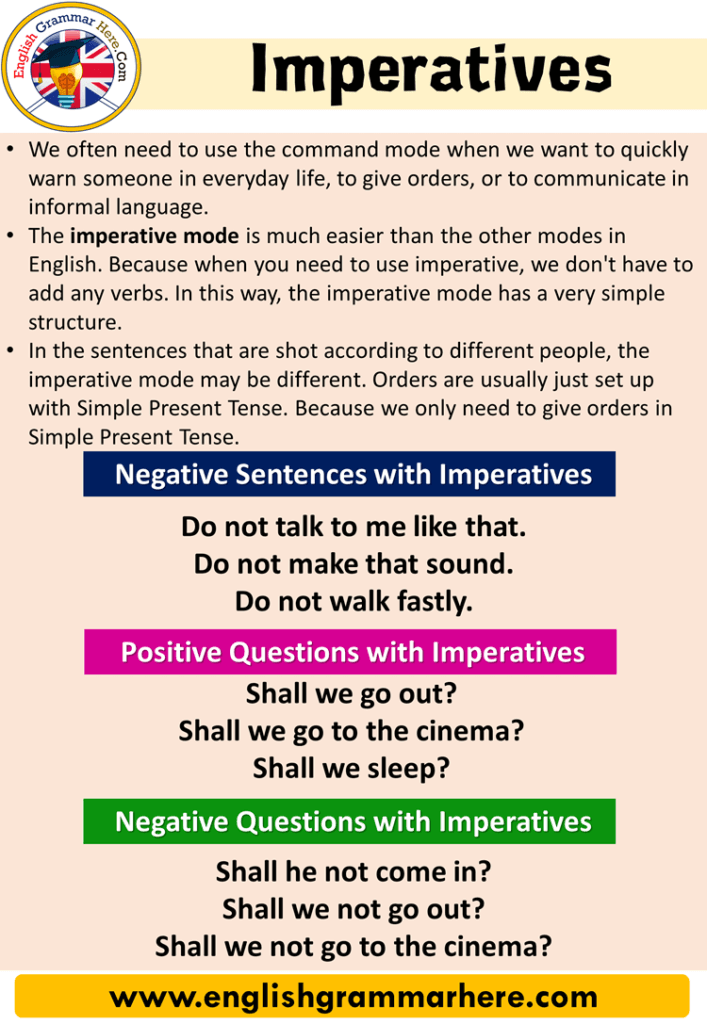Understanding Imperatives In English: A Comprehensive Guide
Imperatives in English are an essential part of the language, used primarily to give commands, make requests, or offer suggestions. They play a crucial role in everyday communication, whether in spoken or written forms. Understanding how to use imperatives effectively can greatly enhance your ability to convey messages clearly and assertively.
In this article, we will explore the different types of imperatives, their grammatical structure, and how they are used in various contexts. Additionally, we will provide examples and practical tips to help you master the use of imperatives in your daily conversations. By the end of this guide, you will have a comprehensive understanding of imperatives in English.
Whether you are a language learner or a native speaker looking to refine your skills, grasping the concept of imperatives is vital. Let’s dive into this topic and unlock the power of imperatives in English!
Table of Contents
- What Are Imperatives?
- Types of Imperatives
- Structure of Imperatives
- Positive and Negative Imperatives
- Using Imperatives in Requests
- Using Imperatives in Instructions
- Using Imperatives in Suggestions
- Common Errors in Using Imperatives
- Conclusion
What Are Imperatives?
Imperatives are verb forms that express commands, requests, or instructions. They are typically used to direct someone's actions and can be issued to anyone, including the listener, the speaker, or a third party. Here are some key points about imperatives:
- Imperatives usually use the base form of the verb.
- They can be used in both positive and negative forms.
- Imperatives can be polite or direct, depending on the context.
Types of Imperatives
There are several types of imperatives that you can use in English. Understanding these types will help you use them effectively in different situations.
Direct Imperatives
Direct imperatives are straightforward commands given to someone. For example:
- Close the door.
- Turn off the lights.
Polite Imperatives
Polite imperatives soften the command, making it more of a request. For instance:
- Please pass the salt.
- Could you help me with this?
Structure of Imperatives
The structure of imperatives is quite simple, typically consisting of just the base form of the verb. Here’s how it works:
- Base Verb: “Sit,” “Run,” “Listen”
- Subject: The subject is often implied and does not need to be stated (e.g., “(You) sit down.”)
Positive and Negative Imperatives
Imperatives can be categorized into positive and negative forms:
Positive Imperatives
These are commands that encourage action:
- Take a seat.
- Enjoy your meal.
Negative Imperatives
These instruct someone not to do something:
- Don't touch that!
- Do not enter.
Using Imperatives in Requests
Imperatives can also be used to make polite requests. Here are some examples:
- Could you please send me the report?
- Please wait for a moment.
Using Imperatives in Instructions
Imperatives are commonly used in instructional contexts, such as recipes or manuals. For example:
- Preheat the oven to 350°F.
- Mix the ingredients thoroughly.
Using Imperatives in Suggestions
Imperatives can also be used to offer suggestions. For instance:
- Try this new restaurant.
- Visit the museum this weekend.
Common Errors in Using Imperatives
While imperatives are straightforward, there are common mistakes to avoid:
- Using the subject: “You sit down” instead of just “Sit down.”
- Failing to use polite forms when necessary.
Conclusion
In summary, understanding imperatives in English is crucial for effective communication. By mastering their usage, you can give clear commands, make polite requests, and offer useful suggestions. Remember to practice using both positive and negative forms to enhance your conversational skills.
If you enjoyed this article, please leave a comment below or share it with others who may benefit from learning about imperatives in English. For more informative content, feel free to explore our other articles!
Thank you for reading, and we hope to see you again soon!
Article Recommendations
- Skarsg Rd Family
- Lostgolfballs
- Yvonne Elliman
- What Happened To Cinna In The Hunger Games
- Does Ava Max Have A Husband
- Flippin Jacks Ames
- Disney Junior
- Napoleonynamite Actor
- What Is An Ihome
- New York State Education


